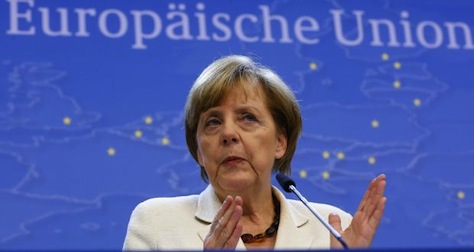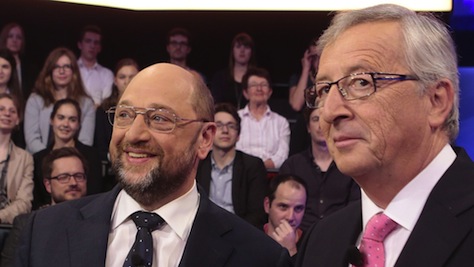Bowing to pressure from European parliamentary leaders, the European Council has proposed as its candidate for the presidency of the European Commission Jean-Claude Juncker, the former prime minister of Luxembourg and former head of the Eurogroup, the informal gathering of the eurozone finance ministers. ![]()
That makes it virtually certain that the European Parliament will elect Juncker (pictured above) as the next Commission president, likely with the full support of the two major pan-European parties in the Parliament, Juncker’s own center-right European People’s Party (EPP) and the center-left, social democratic Party of European Socialists (PES). It also likely means that the PES candidate for the Commission presidency, Martin Schulz, will become the Commission vice president.
It’s obviously a defeat for British prime minister David Cameron who, just last week, was still holding out hope that he could pull together a blocking minority to keep Juncker from receiving the Council’s endorsement. But by the time the Council gathered to vote, only Hungarian prime minister Viktor Orbán joined Cameron in opposing Juncker. Not only did Cameron fail to win over allies, he failed to keep both Dutch prime minister Mark Rutte and Swedish prime minister Frederik Reinfeldt, neither of whom are enthusiastic about the prospects of a Juncker candidacy.
Contacted by a reporter for the Moscow-based RIA Novosti earlier today, I had a chance to put together some quick thoughts on what the Juncker decision means. Here are my real-time responses, which will double as my real-time analysis on where things go from here.
On how the choice reflects the European parliamentary elections on May 25:
The choice reflects the fact that Juncker was the candidate of the European People’s Party, the pan-European group of center-right, Christian democratic parties, and the EPP won the greatest number of seats in the European parliamentary elections on May 25. The EPP nominated Juncker as its candidate for the European Commission presidency prior to the May 25 parliamentary elections, just as several other European parliamentary parties nominated their own candidates. The candidates — the German term ‘Spitzenkandidaten‘ developed widespread use across Europe — campaigned throughout the spring, and they participated in a set of debates on the EU’s future.
Under the Lisbon treaty, the European Council is supposed to ‘propose’ a candidate for Commission president, which will be ‘elected’ by the European Parliament, with the Council ‘taking into account’ the results of the parliamentary election. No one knows exactly what that means, but Juncker and the other parliamentary leaders believe firmly that the Council must propose Juncker as its candidate. In so doing today, the Council has set an important precedent for future parliamentary elections, though national leaders will be loathe to admit it.
Proponents of the Spitzenkandidaten system argue that Juncker represents the will of the European electorate, because he’s the candidate of the party that won the most votes, but it’s not so simple as that. There’s no real indication that the majority of European voters were voting on the basis of this or that Commission presidential candidate. Voter turnout has dropped significantly since the first European elections in 1979, and voters often cast their ballots on the basis of national governments or other factors. To the extent there was a unifying theme to the elections, it was the rise of euroscepticism on both the far right and the far left, with the victories of groups like the United Kingdom Independence Party, France’s Front national (National Front) and Denmark’s Dansk Folkeparti (People’s Party). Whatever ‘mandate’ you take away from the European elections, it’s hard to argue there’s a groundswell of genuine democratic support for Juncker. It was only last October that Juncker’s own center-right Christian Social People’s Party suffered so many losses in Luxembourg’s national elections that he was forced out as prime minister after 18 years.
Continue reading European Council proposes Juncker as Commission president



